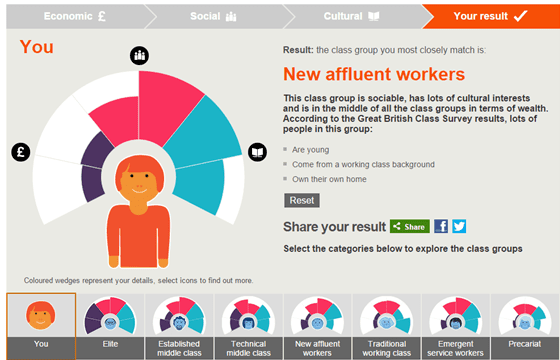
Most of us are familiar with the NRS Social Grade system, encompassing A, B, C1, etc. This was devised 50 years ago and is based on occupation. Fast-forward to 2016, and only a tiny proportion of the population are considered as manual workers. This shoehorns most of the us into Grades A, B and C1, groups which are too broad to have value. Is it time for a new definition of Social Class?
As a member of the Market Research Society, I am regularly invited to events and lectures. Last Tuesday evening (1st March), I attended an event presented by Professor Mike Savage of the London School of Economics. In 2013, he undertook a survey through the BBC that was designed to understand the current UK ‘class’ system, and thereby help define a new method of class classification.
[fusion_builder_container hundred_percent=”yes” overflow=”visible”][fusion_builder_row][fusion_builder_column type=”1_1″ background_position=”left top” background_color=”” border_size=”” border_color=”” border_style=”solid” spacing=”yes” background_image=”” background_repeat=”no-repeat” padding=”” margin_top=”0px” margin_bottom=”0px” class=”” id=”” animation_type=”” animation_speed=”0.3″ animation_direction=”left” hide_on_mobile=”no” center_content=”no” min_height=”none”]
Is this concept of social class still relevant?
In an attempt to build a new classification, Professor Savage teamed up with the BBC to undertake the largest-ever social class survey of its kind. Promoted by the BBC for five months and receiving 161,000 respondents, the team was provided with more data than it could have ever imagined. Each response was scored economically, socially and culturally in order to track themes and trends.
In order to ensure the sample was representative, the team also undertook the same survey with a nationally representative sample provided by GfK to identify any skews in its data. What it found was that the BBC survey was heavily weighted towards the most affluent in society, predominantly Grades A and B, but less so C1. This is perhaps unsurprising, considering the BBC’s typical audience. However, using the GfK survey, the data was weighted to reflect the UK as a whole.
The full findings are available on the BBC’s website, and the BBC’s class calculator available here. The most interesting finding for me was that they defined 6% of the UK population as ‘Elite’.
Key facts about this ‘Elite’ class:
- They are the UK’s biggest earners and the most stable economically
- They mainly live in London and the Home Counties
- Over 24% were educated at independent schools and elite universities
- They are the most diverse socially, meaning they claim to have the widest ‘range’ of friends
- They are more diverse culturally, attending the widest range of cultural events.
This group is clearly the core market for independent schools. The question is how we can apply the survey’s findings to our marketing. Is there anything we didn’t already know?
I am not sure how these findings reveal more about ‘class’ than the more granular (and implementable) Experian lifestyle index that is the basis of our catchment analyses. Added to that, tools like Experian’s Mosaic are based on real-time lifestyle data recorded as individuals go about their daily lives.
Consequently, while the BBC Great British Class Survey was clearly an interesting experiment and one with undoubted merit, it is not clear to me whether its stated aims were met or why it is better than commercially available products.
It would have been more convincing if the Survey sample had been more diverse than just the typical BBC audience and if the class groupings had not been so heavily income weighted… Perhaps it’s just that I am not happy being defined as:

For more information on the relevance of social class in your school, or to discuss these concepts in more detail, please call James on 01502 722787.
[/fusion_builder_column][/fusion_builder_row][/fusion_builder_container]

